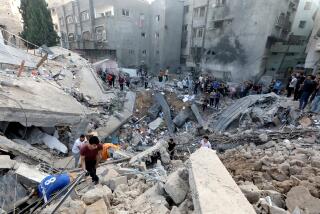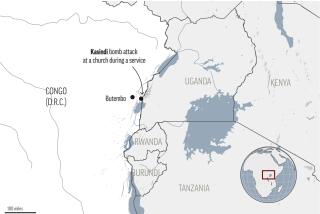Egypt has ‘conclusive’ evidence that Al Qaeda group was behind church bombing
- Share via
Reporting from Cairo — The Egyptian government announced Sunday that it had “conclusive proof” that an Al Qaeda-linked Palestinian militant group orchestrated the New Year’s Day bombing outside a Coptic Christian church that killed 25 worshipers and exacerbated sectarian tensions across Egypt.
Interior Minister Habib Adly blamed the attack on the Army of Islam, an extremist organization based in the Gaza Strip. The naming of foreigners as the culprit may help Egyptian authorities in easing escalating tensions between Muslims and Copts, who make up about 10% of the nation’s population.
Adly indicated, however, that the Army of Islam recruited Egyptians in planning the bombing in Alexandria. Cairo has long accused militants in Gaza — backed either by Al Qaeda or other the radical groups — of using the Palestinian territory to plot attacks across the border to upset Egypt’s tourism industry and inflame religious mistrust.
“We have conclusive proof of their heinous involvement in planning and carrying out such a villainous terrorist act,” Adly said of the Palestinian organization.
Authorities did not initially disclose what evidence they had. The state-run newspaper, Al Ahram, reported that the government had obtained confessions pointing to the Army of Islam. The Interior Ministry later identified one of the suspects arrested as a 26-year-old Egyptian university student who had traveled to Gaza and was enlisted by the militants to strike Coptic churches.
The Palestinian group has denied involvement. “Despite our praise to those who executed the attack, the Army of Islam has no connection to the Alexandria church bombing,” the group said in a statement.
No one has claimed responsibility for the bloodshed. Egypt has accused the Army of Islam of masterminding a 2009 bombing that killed a French tourist and wounded 24 in Cairo’s historic district. Authorities believe the group also was linked to the capture of Israeli soldier Gilad Shalit in 2006.
The New Year’s Day car bombing at All Saints Church in the coastal city of Alexandria stunned Christians and Muslims alike. The attack was followed nearly two weeks later by another assault on Copts when an off-duty policeman opened fire inside a train, killing a 71-year-old man and wounding five other Christians.
A week ago, Egyptian state security court sentenced a Muslim man to death for last year’s drive-by shooting on a church in southern Egypt that killed six Christians. Copts and Muslims have lived in relative peace in Egypt for generations, but Christians are accusing the government of President Hosni Mubarak of ignoring deteriorating relations and a rise in extremism.
“Our government will triumph over terror, and I will do my utmost to maintain unity between Egyptians,” Mubarak said Sunday in a televised speech during a ceremony honoring police officers. “I will not be lenient with sectarian actions from either side and will confront their perpetrators with the might and decisiveness of the law.”
Amro Hassan of The Times’ Cairo Bureau contributed to this report.
More to Read
Sign up for Essential California
The most important California stories and recommendations in your inbox every morning.
You may occasionally receive promotional content from the Los Angeles Times.











